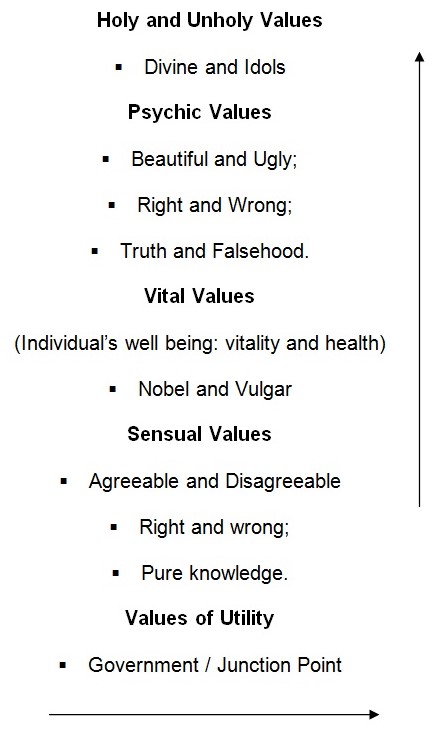Max Scheler, who is considered to be an outstanding German philosopher of the 20th century, developed a hierarchy of values based on the Ressentiment concept. Graphically the hierarchy of values can be presented in the following form:

Positive and negative groups characterize Scheler’s values; values are considered to make a special class of ideal feelings. According to the philosophical position of Scheler, positive value existence is a positive value, while its non-existence is a negative one. The same thing concerns negative value’s non-existence, which is a positive value.
Sensory values can be pleasant and unpleasant with delight and pain as the main components of these values. Pleasant values presuppose luxury and technical values.
Vulgar and noble values are the parts of vital values being associated with well-being. Such concepts as exhaustion, sickness, health, vitality are referred to as feeling state; responses characterized as feeling toned comprise the following elements: anger, courage, and the state of being pleased.
Spiritual values comprise justice and injustice; beautiful and ugly; truth and lie. Joy and sorrow are referred to as feeling states; the responses are dislike, retaliation, reverence, sympathy, delight, approval, and disapproval.
Holy and unholy values, which are at the top of the hierarchy, are related to ‘absolute objects’. Here awe, belief, and worship are the responses, while despair and bliss are feeling states.
Here is the list of basic characteristics for higher values:
- Indivisibility;
- Deeper satisfaction;
- Values generating;
- Experiencing organism independence;
- Enduring ability.
Moral values expressed through good and evil obtain the same characteristics of positive and negative. Good is considered to be higher value realization, while evil is negative value domination. (Scheler, 2007)
Works Cited
Scheler, Max. Value Ethics. Presentation. 2007. Web.